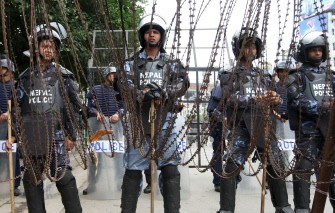KATHMANDU, May 28, 2011 (AFP) - Nepal's ruling parties were locked in 11th-hour negotiations to try to avert a fresh political crisis on Saturday, with hours to go before parliament's term expires.

Nepal's parliament, or Constituent Assembly (CA), was elected in 2008 with a two-year mandate to fulfil the terms of the peace agreement that followed a long civil war and write a new constitution for the world's youngest republic.
It has been unable to complete either task, despite being given an extra 12 months in 2010, and unless a fresh extension can be agreed its term will expire at midnight (1815 GMT) Saturday, leaving the country in legal limbo.
The main opposition Nepali Congress (NC) party is refusing to back a proposal to give parliament more time unless the Maoists, who waged a decade-long insurgency against the state before winning 2008 elections, give up their arms.
NC leader Ram Chandra Poudel told parliament this week the new constitution, aimed at building a peaceful democratic state following years of violence, could not be written "under the shadow of the gun."
But the Maoist party has so far refused to surrender its weapons to the government, resulting in a tense stand-off in the troubled Himalayan nation.
Party spokesman Dinanath Sharma said such to do so would be to "humiliate" the Maoist soldiers who had battled successfully for the downfall of Nepal's widely disliked former king.
"We have asked the Nepali Congress to review their demands," he said. "If the CA is dissolved, they will be responsible for the consequences."
The widespread hope that followed the end of the war in 2006 and the abolition of the monarchy two years later has been replaced by a growing sense of anger and frustration in Nepal, one of the world's poorest countries.
Political instability -- Nepal was without a government for seven months before the current prime minister was elected in February -- has stifled economic growth, forcing many Nepalese to seek work overseas.
Thousands of people have taken to the streets in recent weeks in protest at the slow pace of progress since the 2008 elections and politicians' failure to complete the constitution.
On Friday, protesters set fire to cars in Kathmandu as they tried to enforce a shutdown of the capital, and hundreds of riot police were deployed around the city ahead of the planned vote.
The coalition government, which includes the leftist UML (Unified Marxist-Leninist) and Maoist parties, has proposed a bill to give the assembly more time, but does not have the two-thirds parliamentary majority it needs.
Talks between the parties restarted on Saturday and analysts predicted the tense negotiations would continue well into the evening, with little clear indication of what would happen if no agreement could be reached.
The speaker of the house, Subas Chandra Nemwang, said the parties had no choice but to agree.
"They have time and again said that they are committed to the peace process and the constitution," he told AFP. "I hope they will put aside their differences and reach agreement on those two vital issues."
























